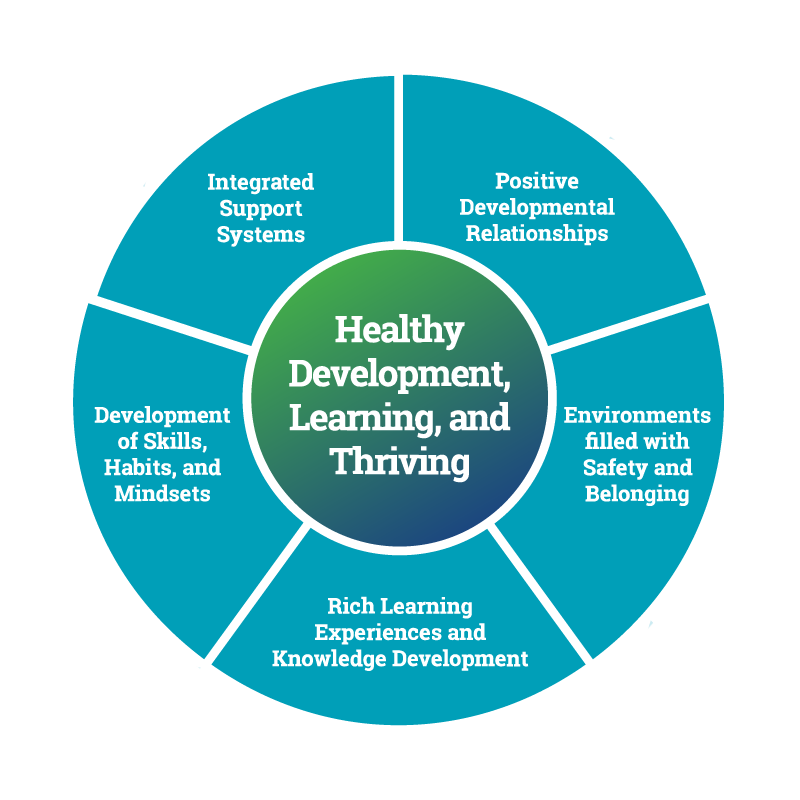 To engage learners in rich learning experiences that develop brain architecture as well as formal knowledge and deep understanding, educators should provide meaningful and challenging work for all students within and across core disciplines, including the arts, music, and physical education. This includes opportunities for students to develop their knowledge in ways that build on their culture, prior knowledge, and experience and help learners discover what they can do and are capable of.
To engage learners in rich learning experiences that develop brain architecture as well as formal knowledge and deep understanding, educators should provide meaningful and challenging work for all students within and across core disciplines, including the arts, music, and physical education. This includes opportunities for students to develop their knowledge in ways that build on their culture, prior knowledge, and experience and help learners discover what they can do and are capable of.
Students learn best when they are engaged in authentic activities and are collaboratively working and learning with peers to deepen their understanding and to transfer knowledge and skills to new contexts and problems. They will be empowered to solve these problems through formal and informal feedback from peers and adults as they engage in activities.
Because learning processes are very individual, teachers need opportunities and tools to come to know students’ experiences and thinking well, and educators should have flexibility to accommodate students’ distinctive pathways to learning, as well as their areas of significant talent and interest. Approaches to curriculum design and instruction should recognize that learning will happen in fits and starts, which requires flexible scaffolding and supports, differentiated strategies to reach common goals, and methods to leverage learners’ strengths to address areas for growth. A school can consider the following:
-
-
curriculum and program offerings that support inquiry and problem-based learning around rich, relevant tasks that are culturally connected and collaboratively pursued;
-
performance assessments and rubrics focused on higher-order thinking skills and applications of knowledge that structure the teaching, tasks, feedback, and metacognitive reflections that guide learning; and
-
tools for learning about students’ experiences, interests, strengths, and readiness that can be built upon to draw connections to the curriculum and foster learning (e.g., learning surveys, student reflections, observation protocols, formative assessments, and exit tickets).
-
-
“two-way” pedagogies that provide knowledge of students as learners and individuals in order to enable explicit connections between students’ prior knowledge and cultural experiences and the content under study;
-
careful scaffolding and supports for students to undertake rich, engaging, authentic tasks, creating zones of proximal development for rich learning through active inquiry and strategic, explicit instruction;
-
recognition of strengths and skills with opportunities to continue to develop them and share them with others, developing positive academic identities;
-
cognitive supports that make tasks doable by structuring them well, reducing unnecessary cognitive load, and that use multiple modalities and tools for accessing information and expressing learning (as in Universal Design for Learning); and
-
opportunities to develop mastery and metacognitive skills, including opportunities to access resources; collaborate; practice; give and receive useful feedback; and reflect, revise, and improve, so that students can ultimately manage their own learning toward mastery of content and deeper learning skills.
 To engage learners in rich learning experiences that develop brain architecture as well as formal knowledge and deep understanding, educators should provide meaningful and challenging work for all students within and across core disciplines, including the arts, music, and physical education. This includes opportunities for students to develop their knowledge in ways that build on their culture, prior knowledge, and experience and help learners discover what they can do and are capable of.
To engage learners in rich learning experiences that develop brain architecture as well as formal knowledge and deep understanding, educators should provide meaningful and challenging work for all students within and across core disciplines, including the arts, music, and physical education. This includes opportunities for students to develop their knowledge in ways that build on their culture, prior knowledge, and experience and help learners discover what they can do and are capable of.